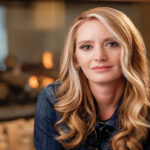She’s been crowned the “Queen of the New Age” and named the “Doyenne of Self-Help,” but Louise L. Hay, pioneer of the personal development industry and multimillionaire founder of the Hay House publishing empire, likes to describe herself as a simple woman with a simple message: Love is all you need.
“I find simple answers work the best: If we really love ourselves, everything in our lives works, she tells SUCCESS. "Love is the great miracle cure." Hay stresses that your thoughts create your reality, so if you choose loving and supportive thoughts, every aspect of your life will improve. "We are 100 percent responsible for all our experiences. Every thought we think is creating our future," she says.
The proof that her philosophy works is evident in her own life. She survived an abusive childhood, dropped out of high school and went on to write more than 30 books (including Power Thoughts, The Power Is Within You and I Can Do It) that have inspired and helped millions of people around the world. With no formal business training, she created an international publishing empire. What’s more, at the age of 81, she starred in the film You Can Heal Your Life (which is also the title of her most famous book).
The Business of Helping Others
Hay House publishing company, founded in 1984, was originally a vehicle to self-publish Hay’s first two books, Heal Your Body and You Can Heal Your Life, which later became international best-sellers. Today, under the financial guidance of its president and shareholder Reid Tracy, Hay House has become one of the fastest-growing self-help publishers in the world, selling books, CDs, DVDs and gifts, all with a positive approach to life. Its stable of 250 authors includes Wayne Dyer, Stedman Graham, Cheryl Richardson, the Dalai Lama, Mark Victor Hansen, Deepak Chopra, Suze Orman and Marianne Williamson, and the company has expanded into Internet radio. In 2007, Hay House sold 6.3 million products and took in $100 million.
“I’ve only ever wanted to help people,” Hay says. “That’s the only thing that interests me. It’s not money, it’s not fame and it’s not anything else. It’s, How can I help? In the whole publishing house, all of our authors come from that space: How can we help to improve the quality of your life? I like to teach people to love and adore who they are, to forgive and to release resentment and to have gratitude and appreciation.”
The desire to help others lead healthier, happier lives really emerged when Hay was in her early 50s and learned she could create a better life by changing her thinking. Until then, she had never read a personal-development book. Although she didn’t know it then, she says she was still imprisoned by her negative childhood programming, the result of being physically and mentally abused by her stepfather and raped by a neighbor.
“My whole childhood was shame, humiliation and fear. I was criticized harshly from the time I was a little girl. I grew up in a very, very challenging household, where I was always wrong and even in the times I was right, there was a lot of beating, a lot of abuse. So I grew up feeling as if I was not very much of anything and not worth anything. I didn’t expect anything.”
Hay fled the misery at home by running away when she was 15, dropping out of high school and finding work in a diner as a waitress. “Being starved of love and affection and having the lowest of self-esteem, I willingly gave my body to whoever was kind to me, and just after my 16th birthday, I gave birth to a baby girl.”
Realizing she could not provide for her daughter, she gave her up for adoption and went to work at a series of menial jobs in Chicago. Eventually, she wound up in New York, found work as a fashion model and met and married a wealthy English businessman. “We traveled the world, met royalty, and even had dinner at the White House,” she recalls in You Can Heal Your Life. But after 14 years of marriage, just when she was beginning to think that good things could last, her husband announced he wanted a divorce.
"I was crushed,” she admits. “I felt that I was a failure and couldn’t do anything right, and this was one more proof that things couldn’t be done right by me. But time passes and I lived on.”
Friends urged her to join their theater group, an experience she found liberating and confidence-inspiring. “I’d already made a fool of myself in front of audiences, so public speaking came easy. I guess life said, ‘You’re ready for the next step now,’ and put it in front of me.”
Hay committed herself to studying, writing and speaking. She began working full time as a counselor, and demand for her talks grew throughout the United States. But then tragedy struck: Hay was diagnosed with cancer. Her subsequent struggle with disease— and recovery—became the basis for her most famous book, You Can Heal Your Life, which she published herself through her new company, Hay House. “I didn’t think the big boys [large publishers] would be interested or, that if they were, they’d want to change everything and wouldn’t let me say what I wanted to say, so I printed it myself.”
Taking Responsibility
That next step appeared in the guise of an invitation to attend a talk, where she heard that if you’re willing to change your thinking, you can change your life. “And I thought, ‘Oh my goodness, really? Could I really be responsible? Could it really be true?’ It caught my attention and there began the next chapter in my life.”
The books and audiotapes were parceled up in Hay’s living room in Los Angeles. “I didn’t think of it as a business because it was so small. As we started to grow a bit, we started to get a little better. I made a lot of mistakes in the beginning, and because I had very little money, I couldn’t hire good people. But time took care of that.”
She recalls with glee how she financed the business in the early years with five credit cards. “I actually went from one to the other for about three years. That was the kind of businesswoman I was. But we made it. We paid salaries and we paid for books.”
Transforming Lives
A year after the book was published, Hay was asked to talk to a group of six gay men who had been diagnosed with AIDS. “When AIDS first came on the public scene, everybody was shunning people, terrified, and nobody would work with them.” Hay began to hold weekly support meetings in her living room for the group, which became known as The Hayride. By 1988, the group had grown to a weekly gathering of 800 people and had moved to an auditorium in West Hollywood. “The reason they kept coming was that I was the first person who said, ‘You’re not a bad person. Let’s take a positive approach.’ ” It was during this time that she wrote The AIDS Book: Creating a Positive Approach, based on her experiences with this group. She and some of the Hayride members appeared on the Oprah show and put out a positive message about AIDS. The same week, she appeared on Donahue with Dr. Bernie Siegel. As a result, You Can Heal Your Life hit the best-seller list and stayed there for 14 weeks. Since then, You Can Heal Your Life has sold more than 35 million copies worldwide. “I’ve learnt to trust life,” she says. “Whatever comes is what is necessary for the next step.”
Although Hay has officially retired—she says she’s written all the books she wants to write—her works and charitable foundations continue to transform lives with the simple and timeless message: Each of us is responsible for our lives and, if we love ourselves, our lives will improve.
No wonder Oprah Winfrey calls Louise L. Hay “the mother of inspiration.” S
You Can Heal Your Life by Louise Hay
It is impossible to really love yourself unless you have self-approval and self-acceptance. This means no criticism whatsoever. I can hear all the objections right now.
But I have always criticized myself.
How can I possibly like that about myself?
My parents/teachers always criticized me.
Self-criticism is just the mind going on with old chatter. See how you have trained your mind to berate you and be resistant to change? Ignore those thoughts and get on with the important work at hand!
Self-approval and self-acceptance are the keys to positive changes. In the days when my own self-denial was so prevalent, I would occasionally slap my own face. I didn’t know the meaning of self-acceptance. My belief in my own lacks and limitations was stronger than anything anyone else could say to the contrary.
If someone told me I was loved, my immediate reaction was, “Why? What could anyone possibly see in me?” Or the classic thought, “If they only knew what I was really like inside, they wouldn’t love me.”
I was not aware that all good begins with accepting that which is within one’s self, and loving that self which is you. It took me quite a while to develop a peaceful, loving relationship with myself.
First, I needed to hunt for the little things about myself that I thought were good qualities. Later I learned to love and approve of all of me, even those qualities I thought were “not good enough.” That was when I really began to make progress.
Exercise: I Approve of Myself
I have given this exercise to hundreds of people, and the results are phenomenal. For the next month, say over and over, “I APPROVE OF MYSELF.”
Do this three or four hundred times a day, at least. No, it’s not too many times. When you are worrying, you go over your problem at least that many times. Let, “I approve of myself” become a walking mantra, something you just say over and over to yourself, almost nonstop.
It is a guaranteed way to bring up everything buried in your consciousness that is in opposition.
When negative thoughts come up, such as, “How can I approve of myself when I am fat?” or “It’s silly to think this can do any good,” or “I am no good,” or whatever your negative babble will be, this is the time to take mental control. Give these thoughts no importance. Just see them for what they are—another way to keep you stuck in the past. Gently say to these thoughts, “I let you go; I approve of myself.”
Thoughts have no power over us unless we give in to them. Thoughts are only words strung together. They have no meaning whatsoever. Only we give meaning to them. Let us choose to think thoughts that nourish and support us.
Excerpt from You Can Heal Your Life by Louise Hay. © 1984, Hay House.









